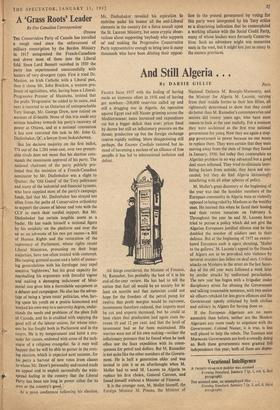A 'Grass Roots' Leader
By Our Canadian Correspondent Ottawa THE Conservative Party of Canada has travelled a rough road since the enforcement of military conscription by the Borden Ministry in 1917 antagonised the French-Canadians and drove most of them into the Liberal fold. Since Lord Bennett vanished in 1939 the party has experimented unsuccessfully with leaders of very divergent types. First it tried Dr. Manion, an Irish Catholic with a Liberal past, then it chose Mr. John Bracken, a western pro- fessor of agriculture, who, having been a Liberal- Progressive Premier of Manitoba, insisted that the prefix 'Progressive' be added to its name, and next it resorted to an Ontarian of unimpeachable Tory lineage, Mr. George Drew, now retired on account of ill-health. None of this trio made any serious headway towards his party's recovery of power at Ottawa, and at a national convention it has now entrusted this task to Mr. John G. Diefenbaker, QC, a lawyer from Saskatchewan.
iBut his decisive majority on the first ballot, 774 out of the 1,284 votes cast, over two present- able rivals does not mean that his election com- mands the unanimous approval of his party. The national chairman of the party publicly pro- tested that the omission of a French-Canadian nominator by Mr. Diefenbaker was a slight to Quebec; the 'Old Guard' of the Tory politicians and many of the industrial and financial tycoons, who have supplied most of the party's campaign funds, feel that Mr. Diefenbaker has strayed too often from the paths of Conservative orthodoxy to support the causes of labour and vote with the CCF to merit their cordial support. But Mr. Diefenbaker has certain tangible assets as a leader. He has made himself a national figure by his assiduity on the platform and over the air as an advocate of his two pet causes—a Bill of Human Rights and the restoration of the supremacy of Parliament, whose rights recent Liberal Ministries, presuming on their huge majorities, have too often treated with contempt. His rasping, guttural accent and a habit of menac- ing gesticulations with his forefinger may repel sensitive 'highbrows,' but his great capacity for marshalling his arguments with forceful vigour and making a damaging indictment of Mini- sterial sins gives him a formidable equipment as a debater and campaigner. He also has the advan- tage of being a 'grass roots' politician, who, hav- ing spent his youth on a prairie homestead and worked his own way to a university degree, under- stands the needs and problems of the plain folk of Canada, and he is credited with enjoying the good will of the labour unions, for whose inter- ests he has fought both in Parliament and in the courts, He is by temperament and habit a cru- sader for causes, endowed with some of the tech- nique of a religious evangelist. So it may well happen that he will be able to garner in the com- ing election, which is expected next summer, for his party a harvest of new votes from classes to whom Mr. Drew's personality and record made no appeal and to exploit successfully the wide- spread feeling in the country that the Liberal Party has been too long in power either for its own or the country's good. j At a press conference following his election, Mr. Diefenbaker revealed his aspiration to mobilise under his banner all the anti-Liberal elements in the country for a fierce assault upon the St. Laurent Ministry, but some cryptic obser- vations about supporting 'anybody who supports us' and making the Progressive Conservative Party representative enough to bring into it many thousands who have been diluting their opposi- lion to the present government by voting, for this party were interpreted by his Tory critics as a disquieting indication that he contemplated a working alliance with the Social Credit Party. many of whose leaders were formerly Conserva- tives. Such an adventure might win numerous seats in the west, but it might lost just as many in the eastern provinces.


































 Previous page
Previous page